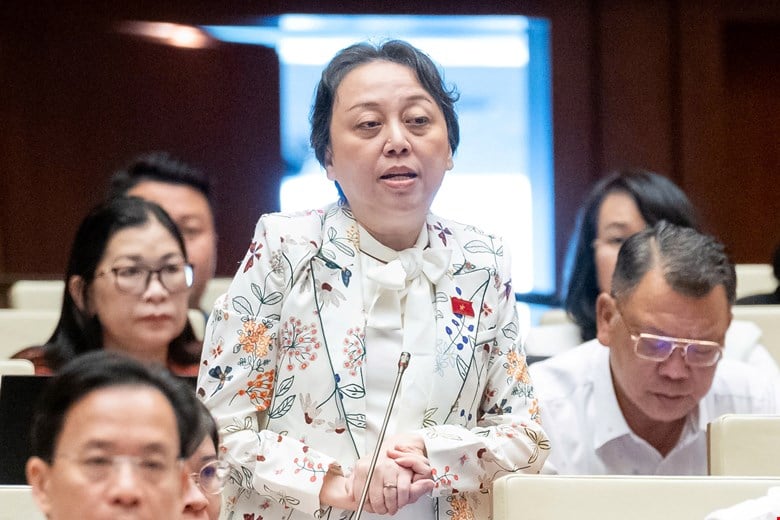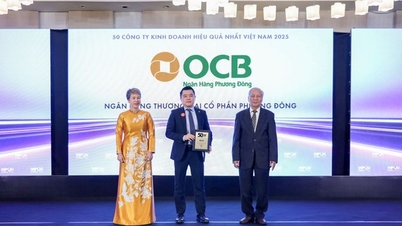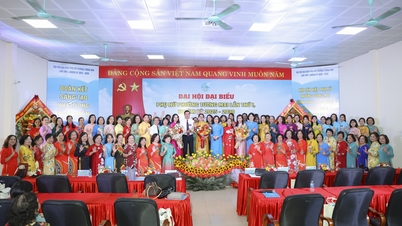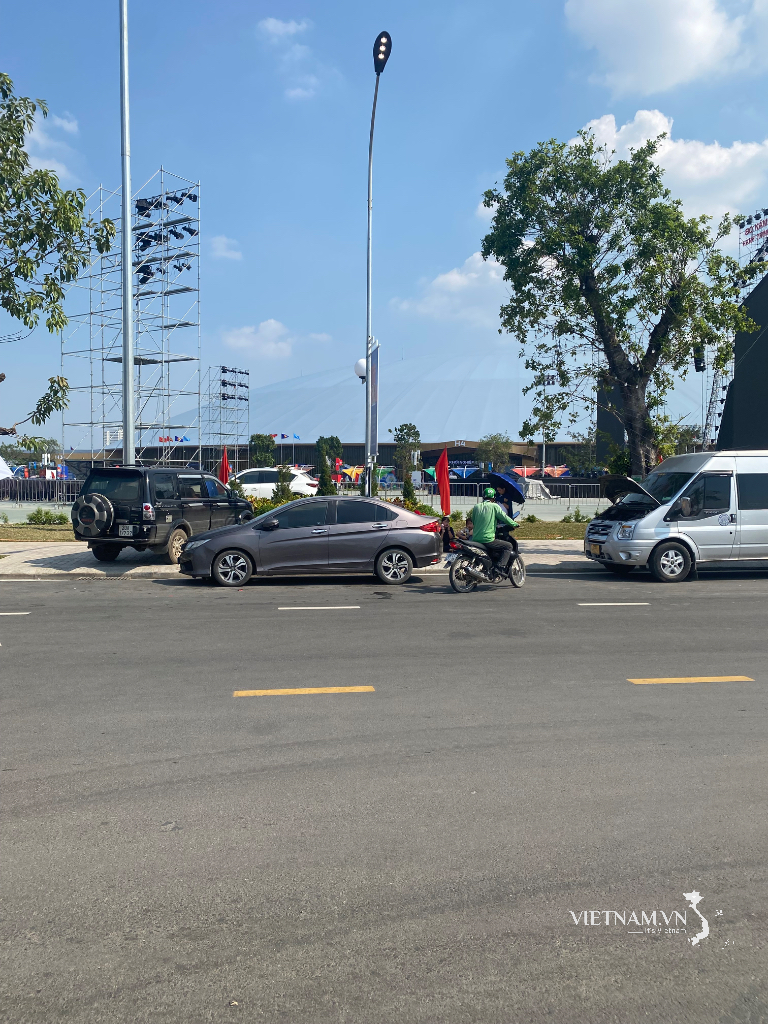According to the agenda, the Law amending and supplementing a number of articles of the Law on Pharmacy will be voted on at the 8th Session of the National Assembly .
 |
| Delegate Pham Khanh Phong Lan participated in the discussion . |
Continuing the 8th Session, on the morning of October 22, the National Assembly discussed in the hall a number of contents with different opinions of the Draft Law amending and supplementing a number of articles of the Law on Pharmacy (Draft).
Regarding drug prices, according to the National Assembly Standing Committee, because drugs are special products that directly affect people's health and health security, drug price management requires the State's participation and regulation so that drugs reach people with quality at reasonable prices. Therefore, the current Pharmaceutical Law stipulates the measure of "declaring drug prices before circulating on the market and re-declaring when changing the declared drug prices". This regulation aims to limit the increase in wholesale drug prices through each intermediary stage, from production facilities to pharmaceutical businesses and to consumers.
However, this measure of declaring expected wholesale drug prices has a different meaning from the declaration measure prescribed by the Law on Prices. Therefore, to avoid misunderstanding, the measure of "declaring expected wholesale prices" is renamed the measure of "announcing expected wholesale drug prices".
At the same time, to specify the process and method of announcing the expected wholesale price of drugs and the responsibility of the state management agency, the draft Law has added explanations for the terms "expected wholesale price of drugs", "announcement of expected wholesale price of drugs", "re-announcement of expected wholesale price of drugs", "similar drug items", clearly defining the subject performing the procedure and the agency receiving the procedure.
At the same time, the Draft stipulates the announcement and re-announcement of expected wholesale drug prices applicable to prescription drugs, except for drugs manufactured or imported for non-commercial purposes that are exempt from announcement according to Government regulations; recommended measures when discovering unreasonably high prices to have a control mechanism if drug manufacturers and drug importers announce unreasonably high expected wholesale drug prices.
Expressing her opinion, delegate Tran Thi Nhi Ha (Hanoi) said, the Draft introduces the concept of expected wholesale drug prices, which is understood as the regulation of maximum wholesale prices to prevent the form of round-trip trading to increase drug prices. However, through the research report on the experiences of a number of countries in the world in the dossier submitted by the Ministry of Health to the National Assembly, the main drug price management model is that the state management agency regulates the ceiling price of drugs such as in Japan, Indonesia, Thailand... The Draft stipulates the maximum wholesale price determined by drug importers and drug manufacturers, and other drug businesses must comply.
According to Ms. Ha, this regulation can lead to the risk of drug monopoly in the market. For example, in the case of drug importers determining the expected wholesale price is very low and establishing a chain of pharmacies to retail. Then, they push up the price of drugs in their retail system, which is the direct sales channel to the people and people still have to buy drugs at high prices.
Delegate Pham Khanh Phong Lan (HCMC) commented that Vietnam is like a “lowland” of the world, any country can export drugs and. Domestic registration numbers overlap a lot, with 800 active ingredients but up to 22,000 registration numbers is too much compared to other countries.
Therefore, Ms. Lan believes that this time the law amendment must limit the number of registrations so that the registration number issuance process is more complete, better, and less negative, not just making commitments on administrative reform.
“Not to mention that with so many different types of drugs, which cannot be distinguished from each other, the process of bidding, purchasing drugs, and choosing drugs by doctors is also very complicated. We have raised the issue of drug price management, but it will be very difficult in such a crowded population,” Ms. Lan worries.
Another issue that delegate Lan mentioned is that the policy wants domestic pharmaceutical enterprises to develop, but in terms of output, in hospitals, the bidding is based on the direction of cheap drugs to win, so enterprises that set quality criteria will certainly only have reasonable prices, not be in the cheapest group. Thus, these enterprises gradually lose the market, do not have much revenue, and have to change direction to increase capital, then foreign enterprises will dominate.
According to the female delegate of Ho Chi Minh City, there is still a lack of direction on managing intermediate levels.
“We want to manage drug prices, but we cannot regulate how many intermediary levels a pill can go through, or what the allowable profit margin is. Currently, we only rely on people voluntarily declaring. When there is no direction to manage the distribution system, the situation of buying and selling in circles, freely selling prescription drugs, or mixing fake and poor quality drugs still happens,” Ms. Lan acknowledged.
Not to mention, the goal of bidding is to choose cheap drugs, but these cheap drugs not only affect the quality of medical examination and treatment but also erode the pharmaceutical industry, making it impossible to develop sustainably.
This is also the direct cause of the continuous shortage of drugs and vaccines in recent years. Everyone says that it is because of the bidding failure. This bidding first affects the rights of the people, the rights of those who pay health insurance when they go to medical facilities, but are not provided with enough drugs as well as the expanded vaccination program, the delegate stated the reality.
In her report, Minister of Health Dao Hong Lan said that medicine is a special commodity, so drug price management is also very important.
“We have seen articles saying why drug prices are increasing so indiscriminately. We have been managing it like this since 2016 and they are still increasing it. If we don’t manage it, we can’t manage drugs even if we let chickens out to chase them,” Ms. Lan explained.
According to the Minister, Vietnam's drug prices have been relatively stable in recent times. In 2022, drug prices will increase by 0.4%, and in 2023 by 1.45% - when after the Covid-19 pandemic, the prices of all drugs and raw materials increased.
The Minister believes that through the measures in the Draft, drug prices will gradually be managed, avoiding sudden price increases in the market.
According to the agenda, the Law amending and supplementing a number of articles of the Law on Pharmacy will be voted on at the 8th Session of the National Assembly.
Source: https://baodautu.vn/sua-luat-duoc-van-ngon-ngang-noi-lo-quan-ly-gia-thuoc-d228027.html



![[Photo] The 4th meeting of the Inter-Parliamentary Cooperation Committee between the National Assembly of Vietnam and the State Duma of Russia](https://vphoto.vietnam.vn/thumb/1200x675/vietnam/resource/IMAGE/2025/9/28/9f9e84a38675449aa9c08b391e153183)

![[Photo] High-ranking delegation of the Russian State Duma visits President Ho Chi Minh's Mausoleum](https://vphoto.vietnam.vn/thumb/1200x675/vietnam/resource/IMAGE/2025/9/28/c6dfd505d79b460a93752e48882e8f7e)
![[Photo] Joy on the new Phong Chau bridge](https://vphoto.vietnam.vn/thumb/1200x675/vietnam/resource/IMAGE/2025/9/28/b00322b29c8043fbb8b6844fdd6c78ea)


















































































Comment (0)